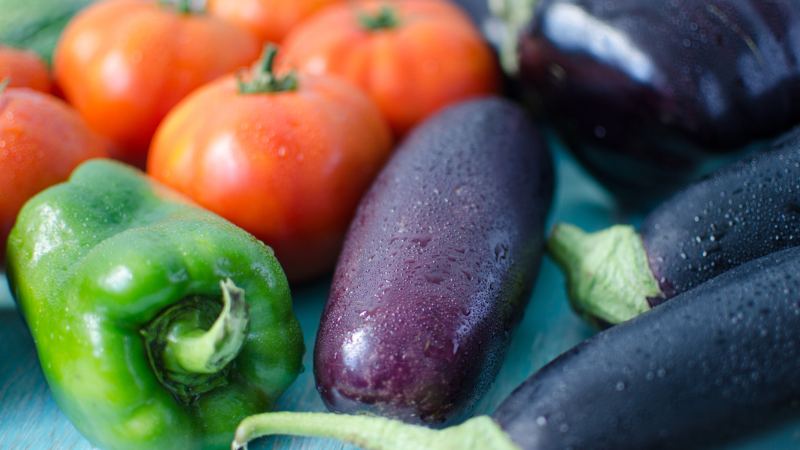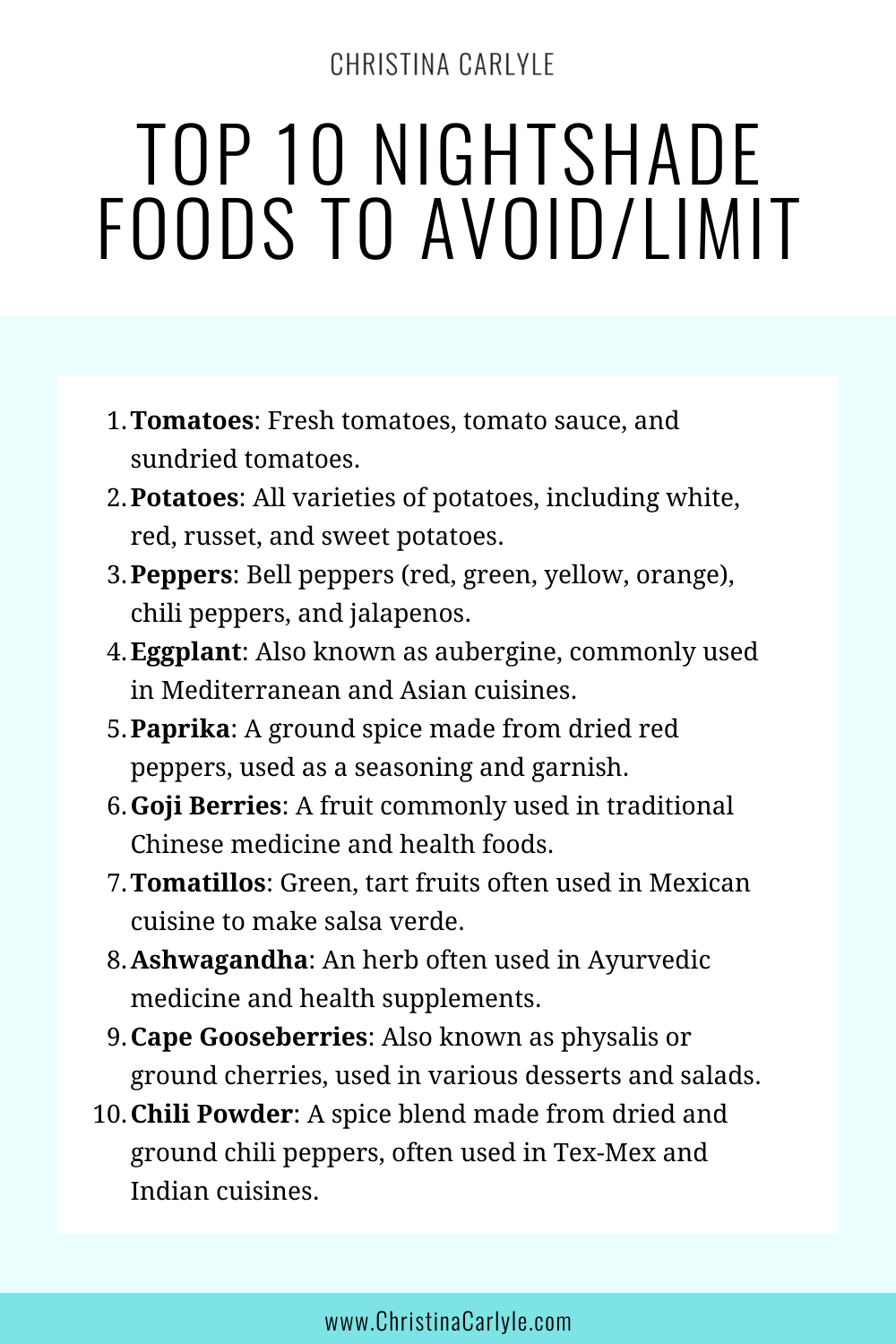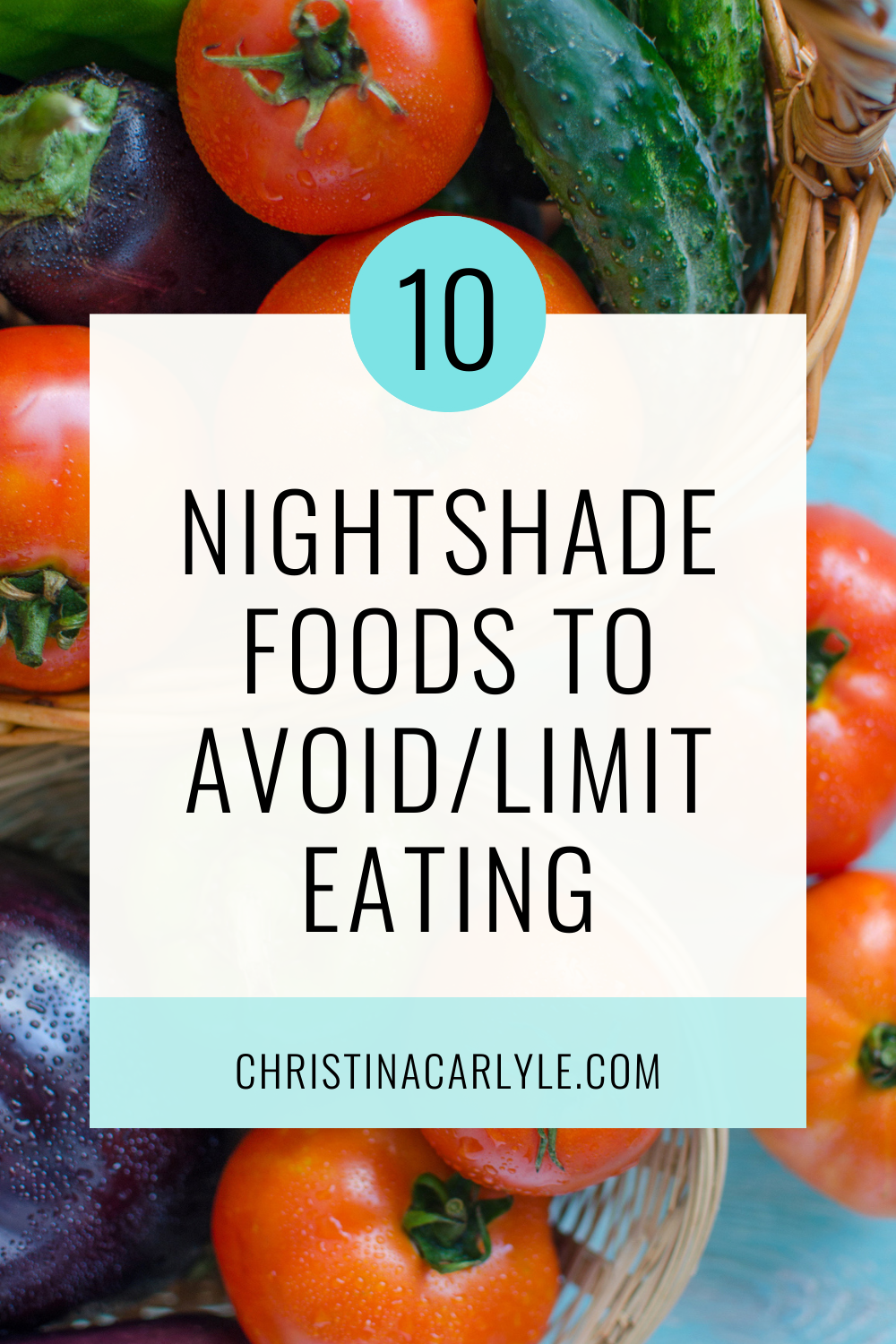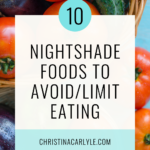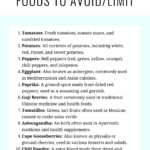Last Updated on August 14, 2023
If you struggle with Gut Health issues/symptoms (like bloating, gas, pain), stubborn fat, food sensitivities, allergies, autoimmune diseases, inflammatory bowel disease, or Leaky Gut, there’s a possibility that a group of foods known as nightshades could be contributing to your symptoms or making them worse.
Navigating gut health issues that cause symptoms can be tricky because a lot of healthy foods contain fibers, enzymes, and plant chemicals that can cause or exacerbate existing health issues & symptoms. I find so many of my clients get confused and aren’t sure what the heck they should be eating.
They try everything… from gluten-free, grain-free, dairy-free, vegan, vegetarian to carnivorous, detoxes, supplements, and everything in between but still have issues and don’t know why. Sometimes they feel some relief but the symptoms don’t go away entirely.
So if this sounds familiar you should consider avoiding nightshades for a few weeks.
I personally found tremendous amounts of relief when I cut nightshades out and have seen dozens of clients benefit by cutting them out of their diets, too. So that’s why I’m doing a deep dive into nightshades.
We’ll discuss:
- How Nightshades Affect Health And Weight
- What Nightshade Are
- Allergies and Sensitivities
- The Top 10 Nightshade Foods
- Nightshade Vegetable Substitutes
- Tips To Avoid/Limit Nightshade Intake
How Nightshades Affect Health and Weight
Nightshade vegetables are generally healthy for most people, but for some individuals, like me, they can cause GI issues similar to wheat or dairy. In some cases, they can cause/exacerbate significant immune reactions. It’s essential to note that each person’s body responds uniquely to each plant in the nightshade family.
For most people, nightshade foods pose no problems. But even the healthiest of people can become sensitive to nightshades… especially after consuming too many over an extended period of time. Eventually, overconsumption can/does cause GI symptoms, food sensitivity, inflammation, and autoimmune reactions.
It’s also important to note that the status of your gut health is directly related to nightshade sensitivity. So if you have any GI symptoms or any of the 7 main gut health issues, I recommend avoiding nightshades for a minimum of 4 weeks to give your body the chance to heal.
Nightshade vegetables have the potential to exacerbate preexisting inflammatory & metabolic issues, too. Those at risk typically include individuals with inflammation, liver/gallbladder issues, hormone issues, autoimmune diseases, or other gut-related illnesses like pathogens or low stomach acid/enzymes.
Sensitivities or intolerances to nightshade vegetables can lead to inflammation, digestive issues, or discomfort. In some cases, these reactions may affect appetite or digestion, potentially impacting weight.
Gut health is essential for proper/optimal metabolic function… Otherwise, you can experience metabolic dysfunction which causes symptoms, health issues, and stubborn fat.
To determine if you have a sensitivity or intolerance, watch out for warning signs after consuming nightshades, such as joint pain, digestive issues, bloating, reddening of the skin, anxiety after eating them, or any inflammatory response, especially if you have leaky gut or autoimmune disease.
Nightshade food intolerance can cause various symptoms, including digestive issues like bloating, gas, abdominal pain, diarrhea, joint pain, skin reactions such as rashes or itching, headaches, and feelings of fatigue after consuming nightshade them. If you have any of these symptoms nightshades are not for you.
What are Nightshades?
Nightshade vegetables belong to the Solanaceae (Solanum dulcamara) plant family, comprising over 2,000 species and about 98 genera.
While this family includes not only vegetables but also harmless flowers like morning glories and toxic herbs like Atropa belladonna, the focus here is on the vegetables, which are a significant part of the family, leading to the nickname “potato family” or “tomato family.”
The main (edible) nightshade vegetables are:
- Potatoes
- Tomatoes
- Eggplant
- Peppers
These vegetables exhibit great variety within the nightshade family. Although the commonality may not be evident on a dinner plate, they share some basic similarities in composition, such as the presence of two substances: calcitriol and alkaloids.
About Alkaloids
Alkaloids are chemical compounds identified molecularly by a ring with a nitrogen atom and are derived from amino acids. They are potent and risky components found in herbal medicine and are present in several nightshade vegetables.
Some notable alkaloids in the nightshade family are solanine, tomatine, capsaicin, and nicotine.
Solanine (& Tomatine)
Solanine and tomatine are glycoalkaloids found in potatoes and tomatoes, respectively. Although not immediately toxic in the amounts ingested in nightshade vegetables, solanine can store in the body and may release during times of stress, causing harm.
Capsaicin
Capsaicin, present in hot peppers, is well-known for its anti-inflammatory properties. It is an alkaloid and causes irritation, releasing substance P, which communicates pain messages.
Nicotine
Nicotine, infamous for being in tobacco, is present in all parts of nightshade vegetables.
Allergies and Sensitivities to Nightshades
While nightshades include both deadly plants and generally safe vegetables, not all compounds are present in every nightshade plant, and not all are strong enough to cause immediate effects.
A true nightshade allergy should be taken seriously and thoroughly investigated. For those with apparent sensitivities, reactions to nightshade vegetables can include irritable bowel disorders, heartburn, nerve sensitization, and joint pain.
While there’s no direct evidence linking nightshade vegetables to arthritis, some anecdotal evidence suggests that eliminating nightshades may alleviate symptoms of joint pain.
For those with autoimmune diseases, it’s worth exploring whether nightshade vegetables trigger inflammation and worsen symptoms.
Top 10 Nightshade Foods
When trying to eliminate nightshade vegetables to confirm sensitivity, it’s crucial to be thorough.
The top 10 most common foods highest in nightshades include:
- Tomatoes: Fresh tomatoes, tomato sauce, and sundried tomatoes.
- Potatoes: All varieties of potatoes, including white, red, russet, and sweet potatoes.
- Peppers: Bell peppers (red, green, yellow, orange), chili peppers, and jalapenos.
- Eggplant: Also known as aubergine, commonly used in Mediterranean and Asian cuisines.
- Paprika: A ground spice made from dried red peppers, used as a seasoning and garnish.
- Goji Berries: A fruit commonly used in traditional Chinese medicine and health foods.
- Tomatillos: Green, tart fruits often used in Mexican cuisine to make salsa verde.
- Ashwagandha: An herb often used in Ayurvedic medicine and health supplements.
- Cape Gooseberries: Also known as physalis or ground cherries, used in various desserts and salads.
- Chili Powder: A spice blend made from dried and ground chili peppers, often used in Tex-Mex, Asian, and Indian cuisines, and hot sauces.
Beware of products containing nightshade derivatives, such as potato starch as a thickener or filler in medications, baking powders, and envelope glue.
Nightshade Substitutions
If you suspect a sensitivity to nightshades, consider substituting them with sweet potatoes, yams, cauliflower, celery, radishes, fresh fruits like blueberries and melons, and mushrooms.
You can also use black and white pepper instead of red pepper for seasoning.
Tips to Avoid & Limit Intake
If you have symptoms associated with nightshade sensitivity, eliminating these vegetables from your diet and choosing high-quality foods may help improve your well-being.
Try cutting them out of your diet for a minimum of 4 weeks. Then you can test that against how you feel when you reintroduce them. If you experience GI distress you most likely have a nightshade sensitivity and should remove or greatly reduce intake.
If you continue to have GI distress even after cutting out nightshades, be sure to check out my gut health series for the best foods, supplements, and more specific recommendations.
I hope this helped you.
Don’t miss my next free training. Download a free copy of my Kickstarter Workout Plan below to get started and added onto my VIP email list.
Stay tuned for next week’s training.
Until then, be well.
Your Coach and Biggest Cheerleader,
![]()
Don’t forget to pin this post to Pinterest so you’ll have it forever.
Be sure to check out my Gut Health Series to fill in more of the “gut health puzzle” so you’ll understand more about the different aspects of gut health, how they cause symptoms & weight gain, and how to optimize your gut health to maximize your weight loss potential:
- Gut Health and Weight Loss
- What are Probiotics?
- Probiotics and Weight Loss
- What are Prebiotics?
- The Best Foods for Gut Health
- What is Leaky Gut?
- Gut Health Supplements
- Intestinal Inflammation
- Gut Microbiome
Remember, if you have gut health symptoms you most likely also have metabolic dysfunction. This free training explains more about metabolic dysfunction & how I fix it so you can lose weight & feel great ASAP.

